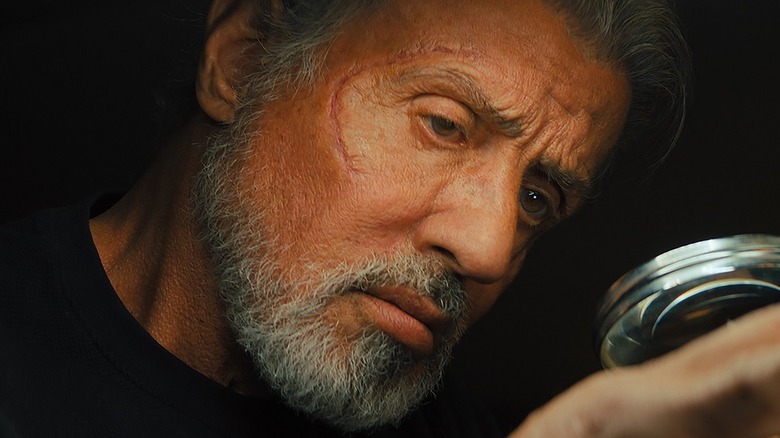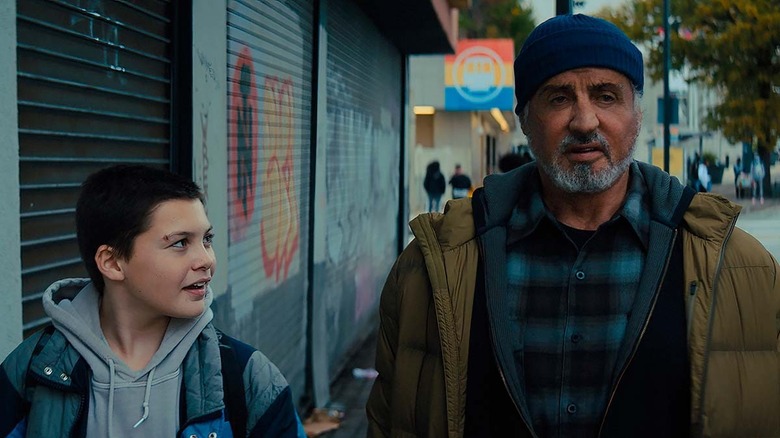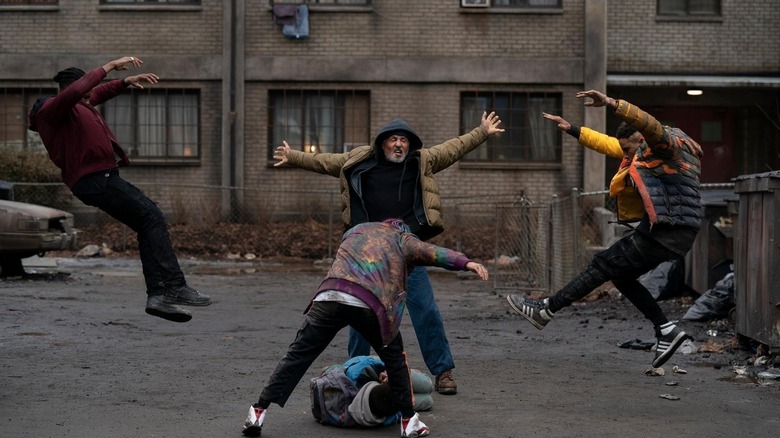Samaritan Review: Sylvester Stallone's Not-So-Super Hero
- Remembers that superhero films are at the best when focusing on the everyday people who need saving
- A pretty intriguing metaphor for Sylvester Stallone's action hero career that's nowhere near as interesting when taken at face value
- A very cliched story of good vs evil
He may be best known as either Rocky Balboa or John Rambo, but Sylvester Stallone's career is littered with numerous attempts to cross over into the realm of the comic book movie; take his ill-fated mid-'90s "Judge Dredd" adaptation, or his supporting appearances in both the MCU and DCEU through his collaborations with director James Gunn. Superheroes have long supplanted the traditional action movie star in the public imagination, and the old guard of that genre's leading men have struggled to reconfigure their screen personas in an era where movie stars conform to the needs of a franchise character, rather than tailor a character to suit their personality.
"Samaritan," the rare original property in the superhero genre (albeit one that has already appeared as a comic, adapted from the long-unproduced screenplay), may predate Stallone's involvement by several years, but feels best understood as a way to make the actor's action hero persona gain a new found relevance in the Marvel age. He may have only boarded the project in 2019, but it frequently feels like world building has been left vague so the character can take a back seat to the star persona itself. This is as much a dissection of Stallone's career as "Creed," a borderline-meta-attempt to analyze what his function is in the movie eco-system now his most successful attempts are decades behind him, only re-entering the spotlight whenever he returns to those former glories. It's just a shame the film never becomes as engaging when taken at face value, as beneath its gritty aesthetics, it remains a fairly ordinary tale of good versus evil that's even more formulaic than the franchise films it thinks of itself as an antidote to.
Everyday superhero
In what is the first red flag that the film we're about to see isn't going to be good, we're introduced to the lore of the "Samaritan" universe via a two-minute exposition dump the second the movie starts. In a nutshell, this tells us that 25 years earlier, the superhero Samaritan and his nemesis, named Nemesis (be warned: this the level of imagination you should expect here) had a deadly fight in a burning building with neither ever seen again in the aftermath. A quarter of a century later and young Sam Cleary (Javon Walton, best known as tween drug dealer Ashtray in "Euphoria") remains convinced Samaritan still walks among us, his theory being that elderly neighbor Joe (Stallone) is secretly the man himself. Despite repeat protestations that he isn't Samaritan, Joe takes on Sam as a young protégé when seeing him bullied by older kids. Meanwhile, the arrival of a gang led by "Game of Thrones" star Pilou Asbæk who want to carry on the legacy of Nemesis only creates a further reason for Joe to once again become the hero many assume he is.
As a throwback to the superhero genre in its most simplistic good versus evil form, there is one thing that "Samaritan" gets absolutely right: At a time when both Marvel and DC increasingly sideline the ordinary people who need saving to focus squarely on the heroes of their worlds, director Julius Avery (best known for his fun WWII zombie flick "Overlord") makes sure the focus remains on the everyday citizens of Granite City, whose lives will be forever changed by the arrival of these larger-than-life figures. Not since Sam Raimi's "Spider-Man" trilogy, where we see how New York's residents directly relate to the events unfolding in their neighborhood, has a film been so curious as to how the lives of normal people would be affected by the sudden re-arrival of superhuman beings.
Of course, this never gets as powerful as, for example, the never-bettered train fight in "Spider-Man 2," where the people of New York join together to protect Peter Parker's identity. Here, superheroes have maintained their near-mythical status, rather than treated as an established piece of society's furniture the general populace have begun to overlook. While watching the film, it struck me that it's been quite some time since a filmmaker has remembered we're supposed to be looking at these figures in wonderment. Even if this is just to further an allegory about Stallone's movie star persona (a legend making the unexpected public comeback), it manages to understand the allure of superheroes better than any MCU effort has managed recently.
Bad samaritan
The problem with "Samaritan" is that the mythical personalities of this world are never expanded on beyond the basics. We know that Samaritan and Nemesis were brothers who took different paths in life, but what they stood for beyond contrasting ideas of good and evil remains a mystery. When we do find out more about Stallone's character later in the film, it's striking largely because it complicates the way the film can be viewed as a simple allegory for the actor's career, but feels unsatisfactory on a straightforward narrative level. The film's idea of villainy is frustratingly underwritten, too; Asbæk's gang leader is effectively a Robin Hood-style figure held in high esteem by the people of Granite City, something never afforded the same complexity as say, a Killmonger-type of bad guy who would make the audience question whether or not they'd side with the hero. The film briefly depicts the way in which the public could find an allure to him, before throwing this out the window entirely once everybody witnesses the return of their long-lost hero.
Eventually, Asbæk dons the Nemesis mask and starts speaking in a cadence distractingly close to that of Bernie Sanders, a move that's particularly bizarre considering the film doesn't otherwise view this good against evil fight as one fought on political terms. In fact, it proves quite hard to get any coherent reading on the ideology of the film's heroes and villains by its end, likely by design. (Stallone has long maintained he isn't a partisan – despite having an outspoken affinity for certain political personalities – so, naturally, the hero he portrays can't represent any distinct ideology, even if the film around him appears to be nudging itself in a certain direction. Instead, this is a film that only satisfies if viewed on allegorical terms; even the setting of Granite City resembles the inner-city Philadelphia streets where audiences saw Stallone for the first time, bringing greater metaphorical weight to the idea of this hero returning here after several years. View this as a superhero story stripped of this deeper meaning, and you're only going to come away feeling underwhelmed.
"Samaritan" is an intriguing attempt to recontextualize Sylvester Stallone's action hero persona when his breed of movie star has long been replaced by superheroes. It never lives up to the potential of this premise though, forgetting that it needs to be just as engaging when taken at face value as it is a feature-length metaphor.


